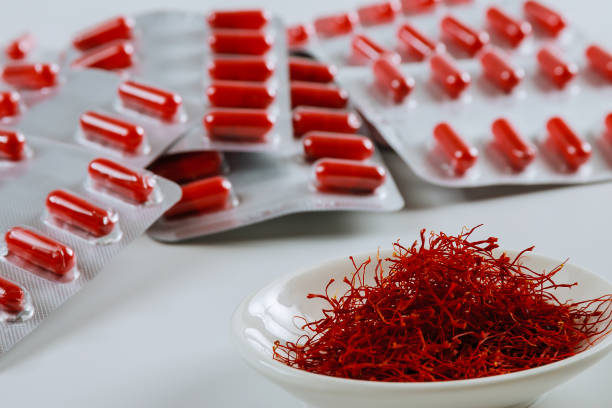How can Safflower be harmful for your health?
Safflower interaction with Drugs
Interaction of a substance generally refers to a potential risk that could develop inside the human body when two or more drugs, products, or medical conditions, interact with one another in a negative manner that could result in certain unwanted health conditions.

Natural products such as safflower are generally considered safe when taken in food amounts but might be harmful when consumed as a medicine amount like supplements. If an individual is medicating with certain medical drugs to treat any condition, there might be a possibility of interaction between those drugs and Safflower. This could cause complications in the condition that is to be treated or could result in new unwanted conditions. Such interacting medical drugs include:
- Antidiabetic drugs– Antidiabetic medicines are used to lower the blood sugar level of the body. Safflower might increase the blood sugar level of the body. Combination of both might result in decreased effectiveness of such antidiabetic drugs. It is recommended to keep a frequent check on the blood sugar level when consuming safflower along with antidiabetic drugs. Such antidiabetic drugs include glimepiride (Amaryl), insulin, pioglitazone (Actos), chlorpropamide (Diabinese), tolbutamide (Orinase), glyburide (DiaBeta, Glynase PresTab, Micronase), metformin (Glucophage), rosiglitazone (Avandia), glipizide (Glucotrol), and several others.
- Antiplatelet/Anticoagulant drugs– Intake of safflower along with drugs that resist blood clotting could increase the risk of bruising and bleeding due to lower blood clotting than usual. Drugs that decreases the blood clotting includes clopidogrel (Plavix), enoxaparin (Lovenox), warfarin (Coumadin), aspirin, dalteparin (Fragmin), heparin, ticlopidine (Ticlid), and several others.
There could be several other medicines causing an interaction with safflower in an unusual manner. It is recommended to consult a doctor or health professional to get complete information regarding safflower and its safety with any other interacting drug.
Precautions and warnings before using Safflower
There are certain medical conditions in a human body in which intake of safflower must be limited. This is done to prevent complications. Interference of this plant could result in worsening of certain medical conditions or might cause other unwanted conditions. Such medical conditions includes:
- Pregnancy– Consuming Safflower during pregnancy is likely to be considered as unsafe. It might cause irreversible conditions such as miscarriage when taken at a medicine amounts. Therefore, a pregnant woman must avoid consuming safflower in such a condition.
- Breastfeeding– There is not enough scientific evidence regarding the safety of a breastfeeding woman or nursing child when Safflower is consumed. Therefore, it is advisable to consult a doctor before consuming safflower during breastfeeding or keep it in food amounts.
- Children– Safflower is usually safe when taken in a food amount for children. However, safety of this herb in long term use in children is not justified yet.
- Bleeding disorder– Safflower has potency to decrease the formation of blood clotting. Its consumption during bleeding conditions could result in excess or abnormal bleeding than usual, resulting in complications.
- Surgery– Safflower reduces the formation of blood clotting. This might increase the bleeding during or post surgery. It is advisable to avoid using safflower before 2 weeks of surgery.
- Allergy– Safflower is unsafe and may cause allergic reactions in people who are allergic to safflower or any of the plant i.e. the member of Asteraceae/Compositae family.
- Diabetes– Safflower oil might elevate the blood sugar level of the body. People diagnosed with diabetes must keep a daily check on their blood sugar level and must consume a minimum amount of safflower.
Side effects of using Safflower
Interaction of safflower with several medical drugs and no precautionary actions against several medical conditions might cause certain unusual or allergic side effects and condition in a human body that includes:
- increases diabetes
- decreases the blood clot formation
- pregnancy defects or abortion
There could be more side effects not mentioned in the above list. An individual must make sure to consume safflower with proper precaution and avoid interaction in order to prevent side effects. However if side effects are observed, it is advisable to contact a doctor or get immediate medical attention as soon as possible if necessary.
REFERENCES:
- https://www.webmd.com/vitamins/ai/ingredientmono-96/safflower
- https://www.medicalnewstoday.com/articles/322245#safflower-oil-for-weight-loss
- https://www.rxlist.com/safflower/supplements.htm
- https://www.ncbi.nlm.nih.gov/pmc/articles/PMC5984022/
- https://www.healthline.com/health/safflower-oil-healthy-cooking-oil#other-uses
For more details, kindly visit below.
One thought on “How can Safflower be harmful for your health?”
I agree with your point of view, your article has given me a lot of help and benefited me a lot. Thanks. Hope you continue to write such excellent articles.